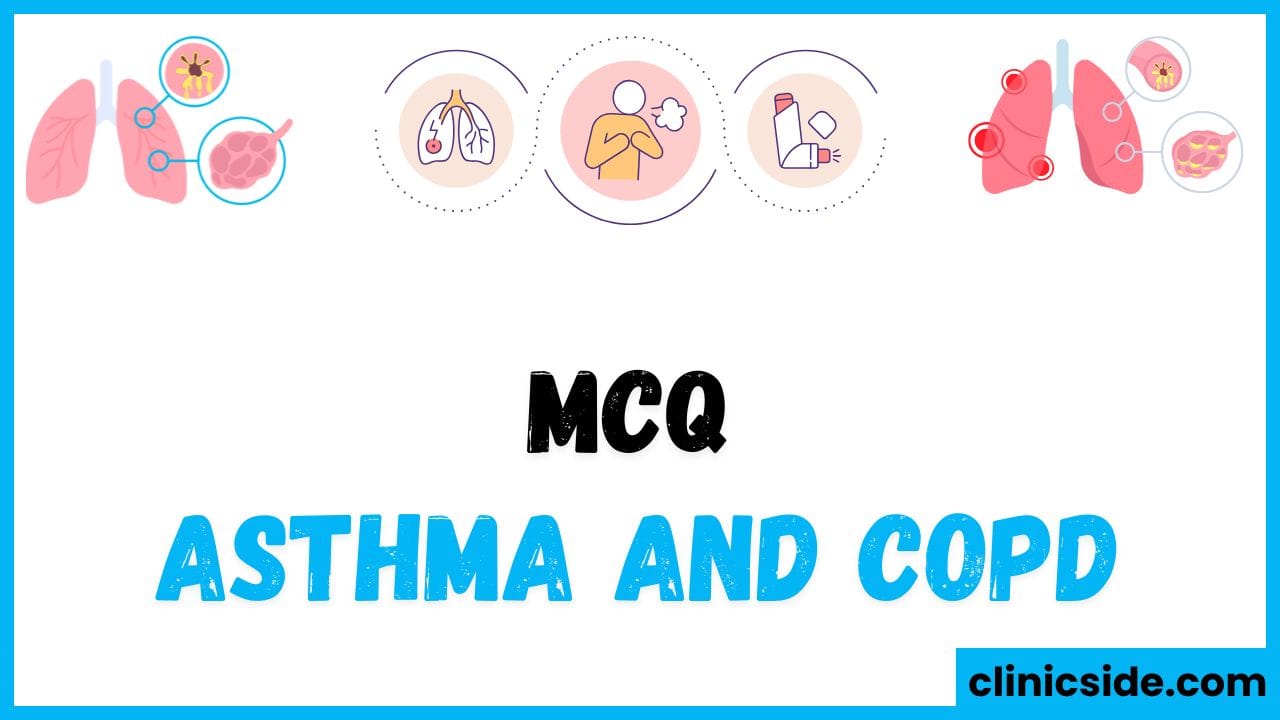Quiz
Available options: 1 to 20
Summary of the MCQs on Asthma and COPD Management Strategies
Asthma Treatment Strategies
Asthma management requires a tailored approach based on the severity of the condition. Omalizumab, a monoclonal antibody, is particularly effective in treating severe asthma by targeting and reducing IgE levels. For managing acute exacerbations, oral corticosteroids are commonly used, while their prolonged use is avoided to minimize side effects. Montelukast is a multi-purpose drug that helps manage exercise-induced bronchoconstriction and co-occurring conditions like allergic rhinitis. For severe persistent asthma, a combination of inhaled corticosteroids (ICS) and long-acting beta-agonists (LABAs) provides significant symptom control and prevents acute episodes.
Non-Medical Interventions for Asthma and COPD
Lifestyle adjustments are an essential part of managing chronic respiratory diseases. For COPD, quitting smoking is critical, as it slows disease progression and improves overall outcomes. Similarly, in asthma, avoiding known irritants or allergens significantly reduces the frequency and severity of symptoms. These non-drug strategies complement pharmacological treatments for improved patient outcomes.
Medications for COPD
The treatment of COPD often includes anti-inflammatory drugs and bronchodilators. Roflumilast, a phosphodiesterase-4 inhibitor, is highly effective for patients with chronic bronchitis and frequent exacerbations due to its anti-inflammatory properties. Tiotropium, a long-acting anticholinergic, is another key medication that helps keep the airways open. For acute exacerbations, systemic corticosteroids are typically employed, particularly in hospital settings.
Addressing Acute Exacerbations
Prompt treatment is essential for managing sudden worsening of symptoms in asthma or COPD. Systemic corticosteroids, administered orally or intravenously, are highly effective in reducing inflammation during severe episodes. Nebulized bronchodilators are another option, particularly for patients who face difficulty using inhalers, providing rapid symptom relief and ensuring effective drug delivery.
Stepwise Treatment Approaches
Stepwise treatment ensures that therapy intensity aligns with the severity of the condition. For asthma, the progression to combined inhaled corticosteroids and LABAs provides enhanced symptom control in persistent cases. In COPD, stepping up treatment may include combining medications like roflumilast and LABAs to manage moderate to severe symptoms effectively.
Unique Roles of Specific Medications
Several drugs have specific functions in respiratory disease management. In asthma, cromolyn sodium works by stabilizing mast cells to prevent inflammatory responses. Montelukast is another versatile medication that benefits patients with aspirin-exacerbated respiratory disease (AERD) and allergic rhinitis. In COPD, roflumilast reduces inflammation and exacerbations, while tiotropium serves as a long-term solution for keeping airways open.
Managing Drug Side Effects
While effective, medications used for asthma and COPD can have side effects. For example, roflumilast is associated with weight loss, which may require monitoring. Prolonged use of systemic corticosteroids can lead to complications such as immune suppression or reduced bone density. Close observation and management of side effects are crucial for patient safety and adherence to treatment.
The Role of Bronchodilators
Bronchodilators, including albuterol and tiotropium, play a crucial role in relaxing airway muscles to ease breathing. These drugs are vital for symptom relief during acute episodes and for maintaining airway openness in chronic conditions like COPD. Nebulized bronchodilators are particularly useful for individuals who struggle with inhalers, ensuring consistent medication delivery.
Preventing Asthma Exacerbations
Asthma prevention focuses on long-term control and avoiding triggers. Maintenance drugs like inhaled corticosteroids reduce inflammation and prevent attacks. Leukotriene modifiers, such as montelukast, are effective in preventing symptoms in patients with aspirin-exacerbated respiratory disease by blocking inflammatory pathways.
Educating Patients for Better Care
Patient education is vital in managing chronic respiratory diseases. Patients need to understand the correct use of medications, such as recognizing that inhaled corticosteroids prevent attacks rather than providing immediate relief. For COPD, educating patients on the benefits of smoking cessation and physical activity can enhance their quality of life. Tailored education fosters better adherence to treatments and improved outcomes.





